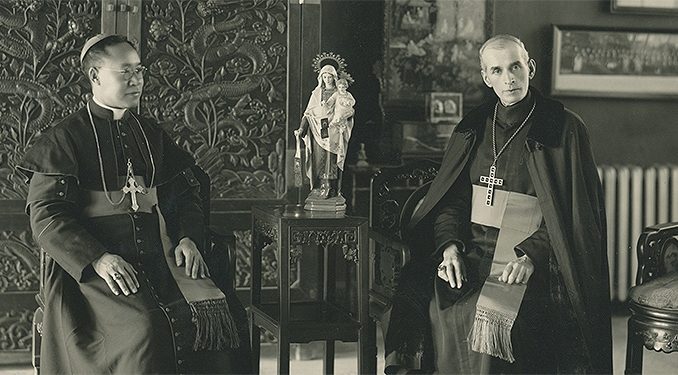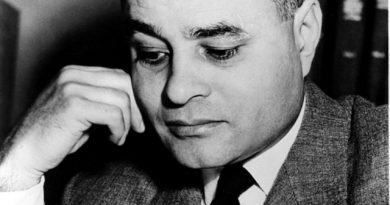Anthony E. Clark and the Sino-Vatican Agreement
Julia Clapis
Staff Writer
Dr. Anthony Clark – sinologist, historian, writer, professor at Whitworth University, and researcher in the Vatican – came to Seton Hall’s Provost to talk about the Sino-Vatican Agreement and the ongoing conflict between China and the Vatican. As Dr. Clark specialized in the relationship between China and the Catholic religion he came to Seton Hall to explain more about this conflict; dating back to before the transition between Imperialist China, also known as its Pre-Communist Era, and Mao Zedong’s proclamation of the People’s Republic of China.
When reflecting upon his interests in Chinese culture and history, Dr. Clark explained, “I would say my very first exposure to China was a Bruce Lee movie as a young boy and then taking my first Kung-Fu class.” Showing that it all began with a simple day-to-day interaction with Chinese culture.
Dr. Clark began by talking about the abrupt change in China’s political ideology, when the communist power finally overthrew the nationalist one, in 1949. Dr. Clark mentioned how the worldwide media portrays this issue; the communist media depicted the Chinese political situation in positive terms; while, the Western coverage was completely anti-China, depicting it as aggressive and tyrannical.
Dr. Clark mentioned three different perspectives on the relations between China and the Vatican: popular media, official documents, and the Vatican archives. He stresses the importance of doing one’s research and looking into all possible points of view rather than taking only one source’s view on such a complicated and conflicting issue. “Official Chinese system of insisting that all religions govern themselves with no outside interference,” explaining the imposition of the Chinese government over Christians, on declaring independence from outside powers.
China’s goals were to renounce any kind of foreign power over the religious system, forcing Church officials to take an oath of independency, while they had to take an oath of obedience to the Pope. Most times, Bishops lived a “double life,” while they claimed to be independent in public, they were actually obedient to the Pope.
One very important concept to understand this entire conflict is the policy of “Sinicization”: or adaptation, meaning religions must adapt to Chinese characteristics and socialism. Dr. Clark discussed a famous Chinese scholar quote, “Government dominant, religion obedient,” which makes it clear the type of conduct the communist Chinese government adopted towards all religions. No religion, however, was targeted for Sinicization more than Christianity ever was, and still is.
Dr. Clark then continued to tackle two main areas of disagreement between China’s government and the Holy See. The first is the consecration of Bishops; in the Catholic Church, the Pope is the one who makes the decisions when it comes to consecrating a Bishop. However, because of the process of Sinicization and the adaptation of Catholicism to the socialist norms of conduct, Bishops in China went through another completely different process, dysregulating the Vatican control Bishops and their qualifications. From China’s point of view, the Vatican’s supervision was an “interference of their own national sovereignty.” The former sees it as a religious issue, while the latter sees it as a political issue.
The following area of disagreement is the non-recognition of the Chinese government by the Vatican. The Vatican only recognizes Taiwan as the central government, and it will only recognize China as a central government and enter a serious dialogue with the Chinese only once they move its diplomatic office from Taiwan to Beijing.
One year after the Sino-Vatican Agreement was signed, not much has changed. With the Policy of Sinicization, came the prohibition of the youth worshipping and going to church. Even with the Vatican attempting to reestablish order in the consecration of Bishops, it is still in a fine line between obedience to the Pope and China’s mandatory declaration of independency from him at the same time. The normalization signed between China and the Vatican has had no meaningful impact to change this complex situation.
When asked about his thoughts on where he would like to see the Christian mission head in China, Dr. Clark said, “Missionaries are illegal in China, so I would like to see missionaries be legalized again… [and] to see more freedom be given to the Christian community in China.”
Dr. Clark believes there is an obvious difference between the relationship that China has with Christianity in comparison with the United States of America. He says that “there is this Christian foundation of the US, it’s something that we accept in this country.” Conversely, he believes that since China became a communist country in 1949, its religious tolerance has decreased more.
He stresses how, with every encounter he has had with Chinese people all around the world, they wish for Americans to recognize them as a part of the Church, stating, “If there’s anything you can do, tell them about us. We’re a part of the body of Christ as well.” Dr. Clark strongly believes Americans tend to overlook China and its growing influence in the global scale, “I think the most important thing for a university student or a university professor is to realize that we don’t live in the center of the planet…People from different cultures view things differently.” He then followed by saying, “We’re all in this together and I think we need to remember that.”
Dr. Clark, in turn, concluded by explaining, “For me, anyway, I think I’m in a unique position to tell Americans, especially American Catholics, that there is this beautiful Church in China that wants to be remembered, that is part of the same community.”


